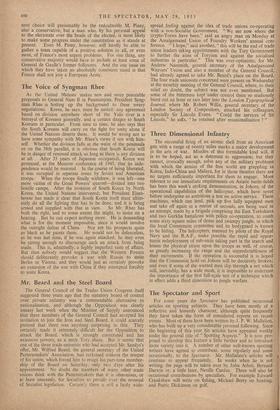Mr. Beard and the Steel Board
The General Council of the Trades Union Congress itself suggested three years ago that the statutory board of control over private industry was a commendable alternative to nationalisation, and although the Opposition was clearly uneasy last week when the Minister of Supply announced that three members of the General Council had accepted his invitation to join the Iron and Steel Board, it could scarcely pretend that there was anything surprising in this. They certainly made it extremely difficult for the Opposition to attack the Board, which is strongly constituted and has extensive powers, as a mere Tory sham. But it seems that one of the three trade unionists who had accepted Mr. Sandys's offer, Mr. Wilfred Beard, the general secretary of the United Patternmakers' Association, had reckoned without the temper of his union, which forced him to resign his part-time member- ship of the Board on Saturday, only two days after his appointment. No doubt the members of many other trade unions think with the Patternmakers that it is obnoxious, or at least unseemly, for Socialists to preside over the reversal of Socialist legislation. Certa in!y there is still a fairly wide- ide- spread feeling against the idea of trade unions co-operating with a non-Socialist Government. "We see now where the crypto-Tories have been," said an angry man on Monday at the Amalgamated Union of Foundry Workers' annual con- ference. "I hope," said another, "this will be the end of trade union leaders taking appointments with the Tory Government -to further the aims of Toryism and against the socialised industries in particular." This was over-optimistic, for Mr. Andrew Naesmith, general secretary of the Amalgamated Weavers' Union and also a member of the General Council, had already agreed to take Mr. Beard's place on the Board. The four trade unionists concerned were present on Wednesday at the monthly meeting of the General Council, where, to their relief no doubt, the subject was not even mentioned. But some of the bitterness kept under control there so studiously burst out an hour or two later into the London Typographical Journal, where Mr. Robert Willis, general secretary of the London Society of Compositors, attacked his colleagues, especially Sir Lincoln Evans. "Could the services of Sir Lincoln," he asks, "be retained after renationalisation ? "


































 Previous page
Previous page